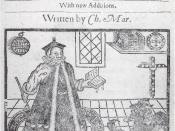Because it focuses on Faustus' aspiration for divinity, Marlowe's Dr. Faustus illustrates the Elizabethan philosophy of the Great Chain of Being. Faustus sells his soul to the devil in exchange for unlimited knowledge, making him like a divinity. This, along with the demons' desire to become as powerful as God, portrays the idea of the Great Chain of Being.
One dark, stormy night, Faustus stands in a magical circle marked with various signs and words and chants in Latin, "Sint mihi dii Acherontis propitii! Valeat numen triplex Jehovoe! Ignei, aerii, aquatani spiritus, salvete! (Marlowe) Suddenly, a dark figure appears in the room. Here, at this very moment, Dr. Faustus sells his soul to the devil in exchange for 24 years of all the knowledge and power he could imagine. Mephistophilis, the demon he had just summoned, agrees to take this offer to his master and departs. Left alone, Faustus remarks that if he had "as many souls as there be stars," he would offer them all to hell in return for the kind of power that Mephastophilis offers him (Marlowe).
Faustus then calls back Mephistophilis, who tells him that Lucifer has accepted his offer of his soul in exchange for twenty-four years of service. With that being said, Faustus signs his soul over to the devil with his own blood. This treacherous act against God sets a foundation for the illustration of the Great Chain of Being.
By selling his soul to the devil, Faustus is not only trying to become omnipotent, but also trying to become higher than man â a divinity. This certain point exemplifies the concept of the Great Chain of being quite clearly. This Elizabethan philosophy, demonstrated in much of the literature during the time, teaches that God is everything and more. Below...


